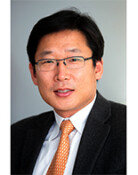Power of Japan`s science
This year`s Nobel Prize in Physics goes to three Japanese scientists. One of them is a Japanese American. Anyways, Japan has so far 22 Nobel Prize winners, including two U.S. citizenship holders. This year`s winners are credited for helping create the energy-efficient and environmentally friendly blue light-emitting diodes.
The first Japanese to win a Nobel Prize is Hideki Yukawa, a professor at Columbia University who won the physics prize in 1949. However, quite a few Japanese had been recommended as candidates for Nobel prizes since 1901. Since the Meiji Reformation era, Japanese politicians attached great importance to science and rapidly accepted modern science. When Hokkaido University (then Sapporo Agricultural College) opened in 1876, its president was William Clark, the former head of the Massachusetts Agricultural College. When Albert Einstein heard about his winning a Nobel Prize in 1922, he was on a ship bound for Japan. He gave lectures across Japan for a month and a half amid passionate welcome. It was amid such an atmosphere that young Japanese dreamed about becoming scientists like Einstein.
Shuji Nakamura, one of this year`s physics prize awardees who received U.S. citizenship in 2000 and currently a professor at the University of California, Santa Barbara, said that anger was his driving force. He said that when he invented blue LED light, his then employer, a Japanese company named Nichia Chemicals, had monopolized his patent and given him a bonus of only 20,000 yen (about $185 at current exchange rates) for his discovery, prompting him to file a lawsuit against the company. "Without my past anger, there wouldn`t have been today`s achievement and Japanese dreams," he said.
Investment in basic sciences and the unyielding Japanese craftsmanship are the major driving force behind Japan as a Nobel Prize powerhouse. Japan shows that scholars` attitude of enjoying studying and the government`s long-term investment are more important than obsession with the prize itself. Korean Minjok Leadership Academy and Pohang University of Science and Technology have already reserved seats for future Nobel Prize winners among their alumni. What is more important will be to create an atmosphere for science.
Headline News
- Israel prepares for retaliation against Iran
- Samsung reclaims top spot, surpassing Apple in smartphone market
- 77% of Koreans in 20s and 30s are 'Kangaroo Tribe' due to job crisis
- KBO referees embroiled in controversy over ABS decision concealment
- Inflation, oil price surge put double shock on global economy






